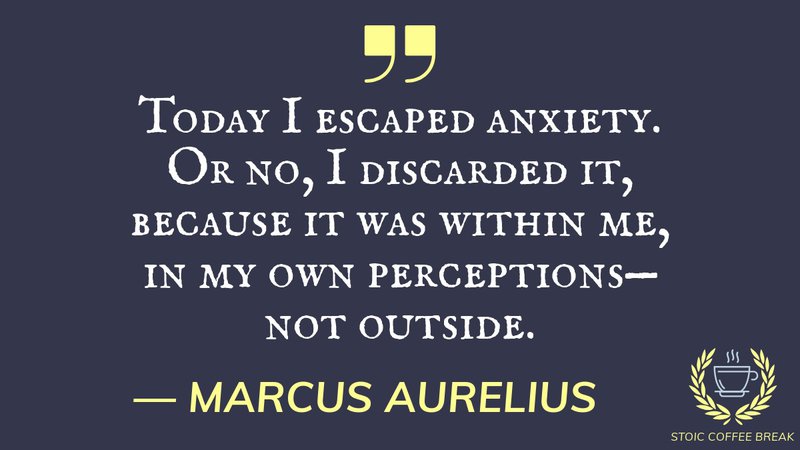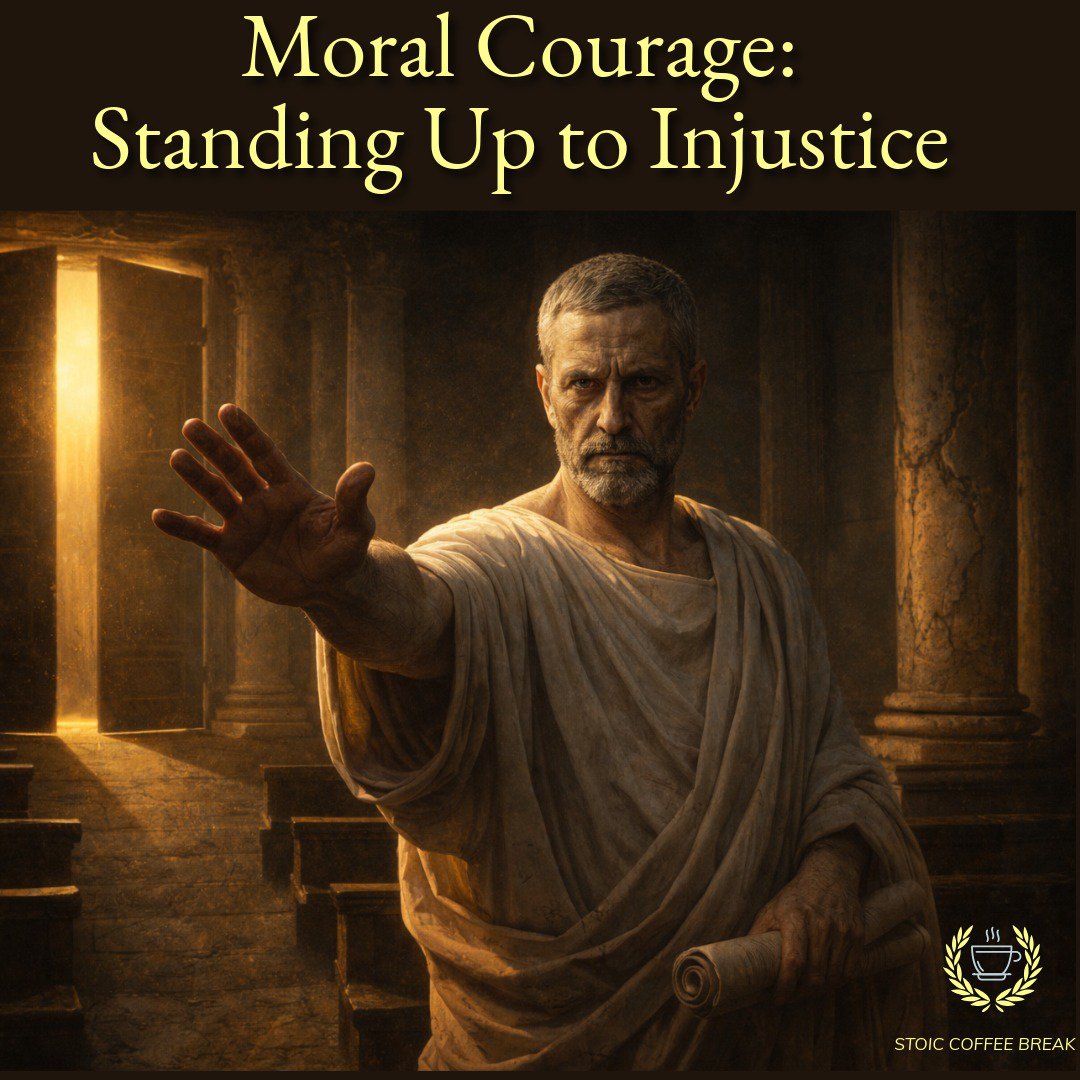
Do you suffer from anxiety? Do you often feel overwhelmed by the complexity of life? Well, today I want to talk about anxiety and how Stoicism can help us understand and deal with it, helping us to live a more relaxed and enjoyable life.
Today I escaped anxiety, or no, I discarded it because it was within me and my own perceptions, not outside.
—Marcus Aurelius.
So last week I took a trip to Portland to visit my family and friends and to pick up some more of my stuff that I wasn't able to bring over with me when I moved to Amsterdam. Now, when I fly, I get anxious. I have a tough time whenever we hit turbulence, I worry about making my flights, which happened twice on this trip, and I'm usually exhausted, which compounds the difficulty of dealing with this anxiety.
So first, let's define anxiety. Anxiety is defined as “a state of apprehension, uncertainty, and fear resulting from anticipation of a realistic or fantasized threatening event or situation, often impairing physical and psychological functioning.”
So basically anxiety is created by our own perception that we have about situations and the possible outcomes that we imagine about them. So let's jump into some Stoic principles and concepts that can help us deal with our anxiety.
Dichotomy of Control
The first is the Stoic idea of the dichotomy of control, which emphasizes focusing on what is within our control and accepting what is not. This principle is essential to managing anxiety because it encourages us to let go of worries about external events that we can't influence. As Epictetus clarifies, “Some things are up to us and some things are not. Our opinions are up to us and our impulses, desires, aversions, in short, whatever is our own doing. Our bodies are not up to us, nor are our possessions, our reputations, or our public offices, or that which is not our own doing.”
Cognitive Distortions
So Stoicism encourages identifying, correcting irrational beliefs and cognitive distortions that contribute to anxiety. By questioning our assumptions and beliefs, we can align our thinking with reality. Seneca advises examining our fears to see if they are rooted in imagination rather than reality. He says, “We are often more frightened than hurt, and we suffer more from imagination than from reality.”
Emotion as a Natural Human Experience
Now, contrary to the misconception that Stoicism advocates for suppressing emotions, it actually promotes understanding and managing emotions rather than being ruled by them. Emotions can also be seen as a flag. If we feel anxious about something, it might be something that deserves our attention. The important thing is that we work on understanding why we feel the way we do. And work on managing our emotions rather than letting them control us. As Seneca reminds us, “Man is as unhappy as he convinced himself he is,” suggesting that emotions can be shaped by our interpretations.
Perspective
And this leads us to perspective. As Epictetus said, It is not events that disturb people, it is their judgment concerning them. The Stoics understood that much of what disturbs us is simply our perspective on the events and circumstances of our lives. They teach us that things external to us are neither good nor bad, but indifference, meaning that it's our judgment about them that make them good or bad in our minds. If we're able to look at things with more rationality and objectively, then we can use anything to our advantage just by changing our perspective.
For example, we might think that having wealth or fame is a good thing, but how many wealthy and famous people are just as unhappy as everyone else? How many famous people, who appear to have everything one could want, committed suicide? By keeping a clear perspective on things and understanding that it's our judgments about things that cause us to feel anxiety, we can start to change the perceptions that we have about the things in our lives.
Mindfulness and Present Moment Awareness
Seneca said, “But life is very short and anxious for those who forget the past, neglect the present, and fear the future.” Now, although mindfulness and being present in the moment is not an explicitly Stoic term, mindfulness aligns with the Stoic focus on being in the present moment. Being present helps us to avoid ruminating about the past or worrying about the future.
Seneca explains this a little bit deeper and says, “True happiness is to enjoy the present without anxious dependence on the future, not to amuse ourselves with either hopes or fears, but to rest satisfied with what we have, which is sufficient for he that is so wants nothing.”
Acceptance of Fate
The next thing I want to talk about is the acceptance of fate. As Epictetus says, “Don't demand or expect that events happen as you would wish them to, accept events as they actually happen. That way peace is possible.” So the Stoic concept of Amor Fati, meaning to love one's fate, is rather than liking the good things that happen to us and hating the negative things, We learn to love everything that happens to us.
And really the reason that we should do this is that these are, these things are going to happen anyway. So it's really just an acceptance of reality and this radical acceptance of life is how you are better able to take control of your, uh, your life rather than just being at the whim of fate and fortune.
As Seneca puts it, “Never have I put my trust in fortune, even when she appeared to be offering peace. All those gifts she bestowed on me in her kindness, position, influence, I stored them where she would be able to reclaim them with no disturbance to me.”
Acceptance of Imperfection and Failure
So the Stoics advocate for the acceptance of human imperfection and the unpredictability of life. When you take time to think about it, you start to realize that failure is just missed expectations. We had an idea of how things should work out, and when they don't, we get upset. This is something in your power that you can change.
Seneca wrote, “Hecato says, Cease to hope and you will cease to fear. The primary cause of both of these ills is that instead of adapting ourselves to present circumstances, we send out thoughts too far ahead.” In this case, hope means that we have expectations of how we think things should be, and that by lowering our expectations, We focus on how things really are rather than what we think they should be.
Rationality as a Path to Emotional Freedom
Next I want to talk about rationality as a path to emotional freedom. In Stoicism there's this idea of impressions and assent, meaning that something comes into our senses, we see something, we hear something, we smell something, and then we take a moment, and we pause, and we decide what this judgment means, or what this thing means.
What is this impression that is coming towards us, or that we've sensed in some way. And then we assent to it, meaning we agree that this is what we actually saw. And Stoicism suggests that rationality and logic can liberate us from emotional turmoil. Because when we feel these feelings, and we take that rationality and logic, then we can see situations more clearly and without bias.
However, this does not mean ignoring emotions, but understanding them through a more rational lens. Now, this may seem counterintuitive because many view rationality and emotions as opposites. Stoicism, on the other hand, integrates them, encouraging rational analysis to guide emotional responses. Next, we should embrace negative visualization.
Embracing Negative Visualization
Seneca explains, “Everyone faces up more bravely to a thing for which he has long prepared himself, sufferings even being withstood if they have been trained for in advance. Those who are unprepared, on the other hand, are panic stricken at the most insignificant happenings.” So the Stoics practice premeditatio malorum, which means the premeditation of evils, contemplating the worst case scenarios to prepare emotionally and reduce fear of the unknown.
Now this doesn't mean that you stress out about the future, but rather you take the time and a safe place to think about what could go wrong so that when it does happen, you You've already experienced what it would feel like to be in that situation.
For example, when I fly, I get anxious when we hit turbulence. It's a very visceral response. So before I fly, I have to walk myself through what I would do if the plane would go down. I think about how I would feel and what I would do in an emergency. I also remind myself that there are two pilots and a computer system whose sole job is to fly and land the plane as safely as possible.
Anxiety of Death and Memento Mori
Another big source of anxiety is the anxiety of death. As Epictetus explains, because we're the only animals who not only die, but are conscious of it, even while it happens, we are beset by anxiety. Now, the idea of no longer existing is something that is terrifying for most of us. But the Stoics teach that we need to get comfortable with the fact that we're going to die.
Memento mori, meaning remember death, is the practice of contemplating and getting comfortable with the idea that we're going to die. And the reason the Stokes have this practice is not because they were morbid, but so that we embrace the life that we have and live it to the fullest. It's also a way to think about how in time, anything that happened will be forgotten. Do you think people in 100 or 500 years will remember the stupid thing you said on the internet? Or that cringy picture that your friend or enemy posted of you? Probably not. So Epictetus often had dialogues when he was teaching. And he had a clever wit as well. And in one of these, I really like this, he says, “You think I can listen to poetry in my position? Why? What is it? I'm sentenced to death. And the rest of us aren't?”
Practical Steps
So what are some practical steps that you can take in your everyday life to help reduce anxiety?
The Stoics hold that living according to virtue was the sole good. And that in any and all situations we need to act with wisdom, courage, justice, meaning how we treat other people. And temperance, meaning self-discipline. If you act with integrity in all situations, then you never have to look back and shame and worry if you did the right thing, you can rest with a good conscience knowing that you acted in a way, in a way that you were proud of. Marcus Aurelius explains it simply: “If it is not right, do not do it. If it is not true, do not say it. For let impulse being your own power.”
Next thing we can do is you work on controlling what you can and let go of the rest by focusing on what's in your power. You can take action and make progress rather than worrying about all the things that you can't control. This takes you out of the place of being a victim of circumstance that and puts you back in a position of controlling what you can.
Next, accept failure as a way to learn. Life is all about trying and failing, and learning from the times when we don't get things right. If you don't learn something from the times when you fell short, then it's a lesson that you've wasted. Next, treat yourself kindly and don't dwell on past mistakes. Learn from them for sure, but ruminating on them is a choice that you are making to punish yourself over something that you have no control over, and is ruining your presence. As Seneca reminds us, “What is the point of dragging up sufferings that are over, of being miserable now, because you were miserable then?”
Next, relax about the future. The future is unknowable. So, worrying about things that may or may not happen, and getting yourself worked up, is to borrow misery about things that may never happen. As Seneca says, “What I advise you to do, is not be unhappy before the crisis comes. Some things torment us more than they ought, some torment us before they ought, and some torment us when they ought not to torment us at all. We are in the habit of exaggerating or imagining or anticipating sorrow.”
Lastly, take some time to practice mindfulness. Getting to know your mind so that you can be aware of the thoughts that are causing you anxiety can help you to be better about seeing a situation as objectively as possible and work on changing your thinking.
In my case, when I'm feeling anxious about something, I try to view the situation as objectively as possible and notice the thoughts that I'm having and what emotions those thoughts are creating. This gives me a little distance from them and allows me to deal with them more rationally and to even change my thinking around the situation.
In conclusion, anxiety is a natural part of life, and it's easy to feel overwhelmed by our complex world. But the Stoics understood a long time ago that most of the anxiety that we feel is due to our way of thinking about the things that happen. By taking steps to understand our own minds, Controlling what we can and letting go of the rest, we can find ways to relax and even enjoy the ride.
Visit the Stoic Coffee Break website for more episodes, transcripts, and merch.
Find out more about the Leadership Mastermind.
Find me on linkedIn, instagram, twitter, or threads.
Thanks again for listening!


